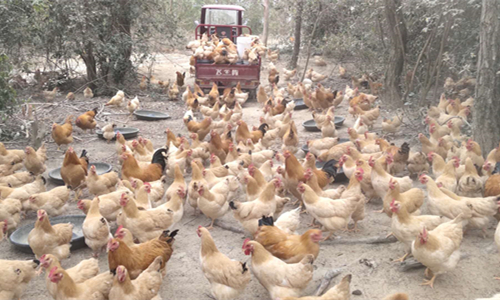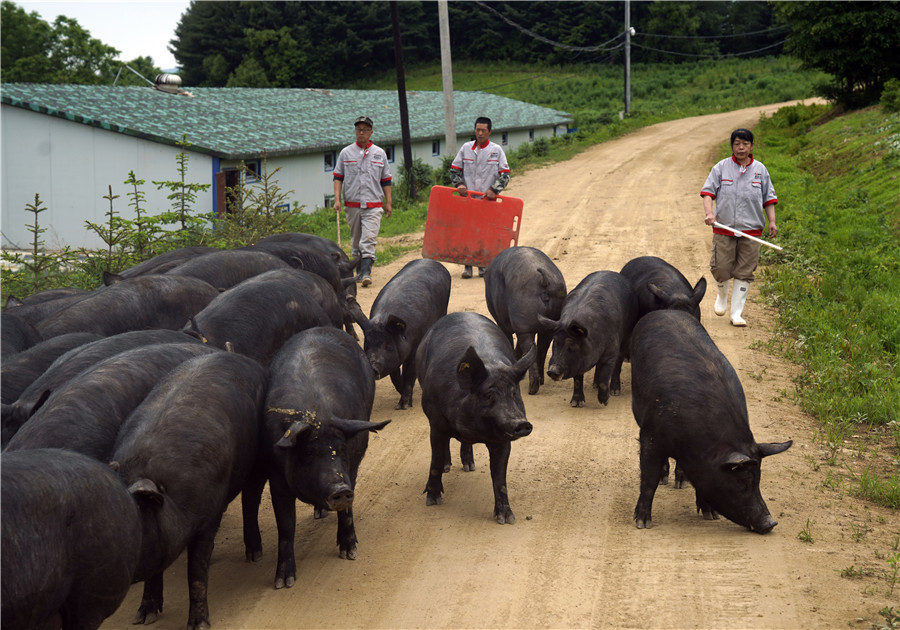
From the People's Daily App.
This is Story in the Story.
China's move to ban wildlife trade amid the COVID-19 epidemic has left farmers raising animals for a living with an economic dilemma.
In late February, the National People's Congress (NPC), China's top legislature, adopted a decision which prohibits the consumption of terrestrial wild animals under state protection, including those that are bred or reared in captivity.
Li Boan, a farmer in Heyuan city, South China's Guangdong Province, had a business of raising bamboo rats, a food ingredient in some southern China regions, that was halted according to the regulation and now he's under huge financial pressure.
At the same time, the Ministry of Agriculture and Rural Affairs has been seeking public opinion on a revised list of edible animal species in the latest effort to distinguish between livestock and wildlife.
Today’s story in the story looks at the difficult issue of determining which categories animals should be put into.

Hens that Li Boan raises (photo: Courtesy of Li)
To help wild animal raising farmers to survive the financial crisis, Heyuan authority is guiding and teaching them to shift their business, said Yuan Dingyang, an official with Heyuan poverty-alleviation bureau.
"We attach great importance to this issue," Yuan said, adding that poverty-alleviation officials across Heyuan's counties and villages had visited every wildlife-breeding household by late February to listen to their difficulties and persuade them to switch to other businesses.
In Li's Dongyuan county of Heyuan, for instance, government had assigned experts to teach wildlife-raising farmers to breed hens, grow mushrooms or brew wines instead, Yuan said.
Li is turning to raise hens under governmental technical support. He plans to buy chickens, which may create 30,000 yuan of profit after months of raising.
"That profit is less than breeding and trading bamboo rats," Li said, adding that his 500 bamboo rats could earn him at least 100,000 yuan of net income each year. "But raising hens is the best choice for me right now."
In some regions of China, wildlife breeding used to be a government-encouraged industry for people living in poverty. In Heyuan, there are 785 former poverty-stricken people who reared wild animals such as bamboo rats and snakes to make a living, and the now-banned business had helped them get out of poverty in 2019, Yuan said.
The unexpected pandemic, however, has not only prompted legislators to halt the wildlife trade but also educate the general public not to eat wild animals.
To overcome the accompanying financial crisis, all of the 785 involved farmers in Heyuan had turned from wildlife rearing to other businesses with the help of local government by March, Yuan said. "What we will make efforts to do this year is to prevent them from falling back into poverty in the face of the ban," he added.
The Ministry of Agriculture and Rural Affairs said it has drafted a new version of the national catalog of livestock and poultry genetic resources in light of the decision to ban wildlife trade.
The draft catalog lists 18 traditional livestock and poultry species (including pigs, cattle, chickens and ducks) and 13 special species, whose breeding and consumption would be subject to anti-epidemic and other rules.
Most of the animals labeled as "special species" in the new list, including ostriches, silver foxes and minks, were not included in the previous version of the catalog, even though they have been domesticated and bred for decades and are central to extensive industry chains.

Employees walk hogs at a pig farm in Fusong, Jilin province. (Photo: Xinhua)
Gan Yuanchun, a lawyer and an adviser to the Hunan Cuisine Industry Promotion Committee, said the new rules were very strict because they did not exempt some domesticated species.
"In practice, it's really hard for watchdogs to discern wild species and their domesticated relatives," he said.
In another policy interpretation, the ministry said dogs were not added to the new list as they are essential human companions, and it is a common global practice and a sign of civilization not to treat dogs as livestock.
Neither the draft catalog nor the existing one includes bamboo rats, one species suspected of being an intermediary host for the novel coronavirus.
Gan said that, given the economic importance of bamboo rats, there was still hope for minor modifications to the draft could save them from being banned for good.
(Produced by Nancy Yan Xu, Brian Lowe, Lance Crayon and Da Hang. Music by bensound.com. Text from Global Times, China Daily)


